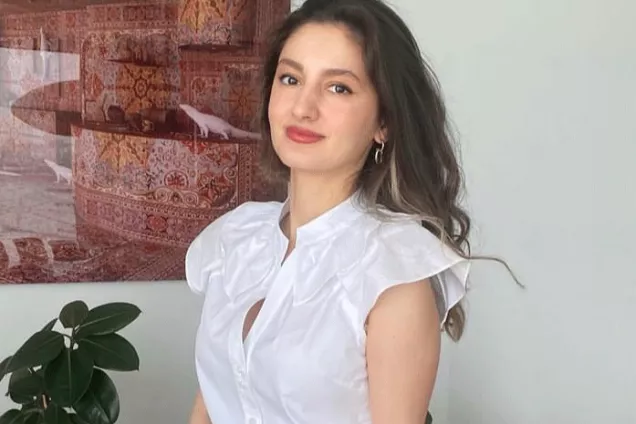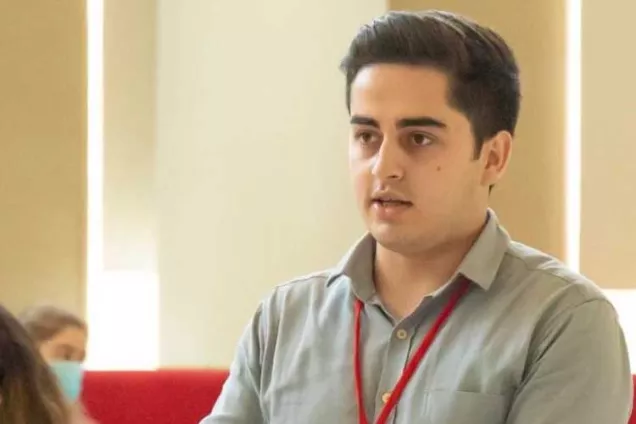What Anna says about the Master's in European Business Law
Anna Zemskova from Russia, now doing a PhD at the Department of Law at Lund University
How did you find out about Lund University?
“I started researching different programmes during the final year of my Bachelor’s degree. There were not very many options to choose from and I really wanted to do a two-year degree programme, so Lund was a perfect choice for me.”
What was the appeal of this particular programme?
“First of all, this Master programme specialises in the area that I was particularly interested in – European Business Law. I majored in Private International Law during my Bachelor’s degree, so I really wanted to do a Master’s that was linked to private law. Moreover, it was a two-year programme acknowledged in the country where I am from, so that was also one of the decisive factors.”
What did you think of the programme? Did it live up to your expectations?
“It was a very nice programme and it was definitely one of the best experiences I’ve ever had as a student. The teachers, the classmates and the courses all made my Master’s unforgettable. The courses were absolutely amazing and contributed drastically to my knowledge and professional skills.”
What did you think was the best thing about your programme? Did you have a favourite course?
“One of the best experiences for me was the European Law Moot Court Competition course. This course is designed for Master’s students that would like to represent Lund University in the competition organised by the European Law Moot Court Society. I was part of the Lund University team and after winning the regional final in the Hague, we went to the final in Luxembourg where I happened to plead in the Court of Justice in front of the current judges and advocate generals – that was absolutely incredible! All of our coaches helped us tremendously and it was a really amazing experience.”
What were the professors and lecturers on the programme like?
“Our teachers were very accommodating and always eager to discuss things that we didn’t understand or give us extra knowledge. We also had many external lecturers from other countries and universities. Lots of events were also arranged outside of the course programme. We had great opportunities to meet top researchers from all over the world, which is really impressive.”
Was the teaching style different from what you were used to?
“I would say it was a bit different in the sense that more of your time here is devoted to your independent reading. It was a lot of independent, hard work, so you need to be very focused and organised. You’ll need to grasp a lot of knowledge and information and be able to take an active part in discussions. In a way, I already knew what to expect because I had studied in Uppsala as an exchange student during my Bachelor’s programme, so the Swedish educational system was familiar to me.”
Was group work a common feature in the programme?
“We had some courses that were devoted to working in a group. They were the courses at the beginning of the programme, so we could actually get acquainted with each other and become friends. It was a great experience as you suddenly realise that the world is much bigger than you thought – it helps you start thinking outside the box.”
Was the programme very international?
“Yes, we actually had a very international group: there were people from EU countries, Norway, China, Brazil, Russia, Georgia, North Macedonia and Iran. Diversity is one of the traits of the programme – you get insight into the different legal systems, techniques and approaches people use and it broadens your horizon.”
What were the opportunities for networking like?
“There were a lot of events organised by the faculty and student union where students could network with both researchers and practitioners – we went to different lectures, conferences, talks, workshops and seminars where we could expand our network.”
In short, why should prospective students apply?
“If one wants to get a deep insight into the subject and understand it both from the theoretical and the practical points of view, then it's a perfect option.”
What do you think of life in Lund?
“Life in Lund is very multi-faceted and you can always find something that appeals to you. In comparison to living in huge cities, it is a lovely small town, calm and cozy, where I feel extremely comfortable. It took me five minutes to get to the faculty from the student dorm –that is absolutely unthinkable if you live in a large city.”
What are the highlights of your time here so far?
“The student life is definitely one of them. You can, for example, go to different ‘sittnings’ (dinners) held at the nations. It was also very nice to spend time at the beautiful library at Juridicum, as it has a special atmosphere that helps you get very focused. Of course, the European Law Moot Court Competition – that we devoted 7 months to – was an incredible experience!”
Do you have any advice for students considering to come to Lund?
“I would recommend reading as much as possible about the programme, about Lund University and about Sweden. Also talk to people that have studied here and think about what is important for you as a student. In my opinion, studying abroad is always a great experience, as you get acquainted with different people, cultures and approaches that you probably have never thought about before. It definitely enriches you as a person. It is also beneficial for your future: it doesn’t matter whether you will work in your home country or continue working in an international environment – this experience will contribute drastically to your career.”
To what extent did your Master’s prepare you for your PhD?
“The Master's programme was a perfect basis for my future career. Now I’m a doctoral student, I’m really grateful for the great courses that we had during the Master’s, because they constituted the ground for my future work. The topic that I’m working on now was actually inspired by the European Law Moot Court Competition.”

"Our professors are supportive and respect our opinions"
Sevinj from Azerbaijan

”Our professors are always there for us when we need them”
Amil from Azerbaijan

”This programme opens the doors to many opportunities”
Damjan from N. Macedonia
